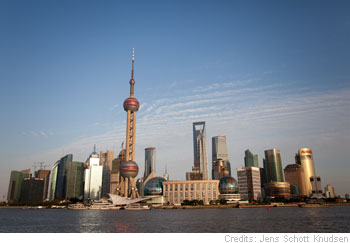 On Wednesday I will be putting up my piece on the politics of China’s adjustment process, but before doing that I wanted to mention a few recent particles worthy of comment. First, Jamil Anderlinin has a long and interesting article in today’s Financial Times on China’s fast-speed railways. The most interesting part of the article, for me at least, was the last few paragraphs where he quotes Zhao Jian, a professor at Beijing Jiaotong University “who favours conventional rail rather than high-speed projects”:
On Wednesday I will be putting up my piece on the politics of China’s adjustment process, but before doing that I wanted to mention a few recent particles worthy of comment. First, Jamil Anderlinin has a long and interesting article in today’s Financial Times on China’s fast-speed railways. The most interesting part of the article, for me at least, was the last few paragraphs where he quotes Zhao Jian, a professor at Beijing Jiaotong University “who favours conventional rail rather than high-speed projects”:
Mr Zhao argues that few passenger trains will actually be taken off existing tracks, because they cannot run on the new high-speed lines and the government is not going to scrap all those old carriages.
The railway ministry accounts for as much as 10 per cent of all outstanding debt in the country, according to World Bank estimates. Chinese analysts say the proportion of railway construction funded by debt has increased from under 50 per cent in 2005 to more than 70 per cent last year.
“This is a real debt crisis building up for the government and it is going to break at some point,” Mr Zhao says. But Mr Scales is far more sanguine. “Even if the ministry can’t pay for all the new lines, the government will step in to cover the costs,” he says. “Governments subsidise their railways in most other countries as well.”
It is the sanguinity of John Scales, described as the World Bank’s transport coordinator in China, that worries me, especially since it is typical also of a distressingly large number of bankers. There is an assumption that losses on infrastructure projects somehow do not matter because of course the government can simply step in to cover them.
But governments do not cover losses. They channel money from households to cover losses. In other words if the Chinese railroad system turns out to be economically non-viable (i.e. the true economic cost of building it exceeds the economic benefits), households will be forced pay for the net reduction in national wealth. This of course reduces future household income and consumption – the surging of which is supposed to make all these infrastructure projects viable.
I am not suggesting that Mr. Scales is unaware of this, but it should be made clear by the World Bank advisors that these “costless” infrastructure projects are part of the mechanism that creates the domestic imbalances that so worries Premier Wen and many of China’s top leaders and economic advisors.
Second, I want to note that last Thursday’s Sydney Morning Herald had a rather overexcited article by Michael Pascoe assuring us that Chinese growth of the past two decades is nothing compared to what we are about to see:
Even if you think you know the “Chindia” story, odds are you don’t really know the Chindia story. And if you’re still caught up in China “housing bubble” and US-consumer-dependency yarns, you’re blinded by Western conceit and actually don’t have a clue. To put it simply in Bachman Turner Overdrive’s 1974 words, baby, you just ain’t seen nothin’ yet.
That first line has perhaps a little unintended irony, especially since the second line suggests that Mr. Pascoe doesn’t know much about the debate within China. For some reason the less a foreigner knows about China the more likely he is to insist that only (other) dumb foreigners with their unyielding biases could disagree with his views
In fact the debate taking place within China is much fiercer than that taking place outside China, and among the blinded so-called Westerners who worry about the China “housing bubble” and US-consumer-dependency yarns you would have to include Premier Wen, Standing Committee members Li Keqiang and Wang Qishan, and a small army of policymakers and advisors centered on the PBoC, the CBRC, the National Bureau of Statistics and the major universities and think tanks.
But that is not why I mention the article. The very next day in an also optimistic but perhaps more grounded article by David Stevenson in the Financial Times, Stevenson quotes a fund manager:
Much of the new investment money is going into consumer sectors, tempted by growing Asian demand for luxury goods. Chris Ruffle is a British fund manager who has worked in China for decades and manages successful funds for Martin Currie. As consumer credit levels start to rise, Ruffle reckons China is set for a consumer boom. “You ain’t seen nothing yet!” he tells me.
You ain’t seen nothing yet? That’s at least twice in two days, and I think I sense a pattern here. From time to time I like to formulate what I call Pettis’ Immutable Laws of Finance and Economics, so here goes:
Pettis Law #17: You have not entered into the final stages of a bubble until you hear repeated use of the phrase “You ain’t seen nothing yet!”




Well with things already way out of control….I guess why not make them even more out of control. Milk it for all it’s worth. Of course the ending result is a mega bomb which could destroy the greater Asian economy for the rest of the century. But hey, they’ve been more than warned. If you don’t change course on this level bad things happen.